
From the moment James Bond walked across the screen and turned to fire at the camera in Dr. No, film history was changed forever. 35 years later, the unflappable super-spy did it again, except this time instead of inventing the popular conception of an action movie Bond became the perfect vehicle to usher in a new era of gaming. First-person shooters (FPS) were about to take the quantum leap from computers to home consoles, and with 007's help they'd have a license to kill sell millions of copies.
When it was released on August 25, 1997, GoldenEye 007 - or GoldenEye 64, if you prefer - won instant praise and numerous awards. It ultimately sold eight million copies, meaning one in three Nintendo 64 owners bought the game. It's now a regular presence in "best video games of all time" lists. Post-1997, first-person shooters like GoldenEye overtook the industry and follow-up 007 games made by different studios - EA and Activision - flooded the market into the 2010s, ensuring that an entire new generation of Bond fans came up primarily knowing the character through video games.
That's why any discussion of James Bond's filmography, like our current De-Evolution of Bond marathon, must nod toward the importance of not just the GoldenEye movie but also the game. Even if you never played GoldenEye 64, its success went a long toward keeping the 007 film franchise's trains running on time, and even after Die Another Day veered the train off the tracks (wow, I'm really sticking with this metaphor) the games kept chugging along.
So, let's start with how entirely improbable it was.
We'll give you 9 people to create the best Bond game ever. You should probably know: 8 of them have never made a game before.
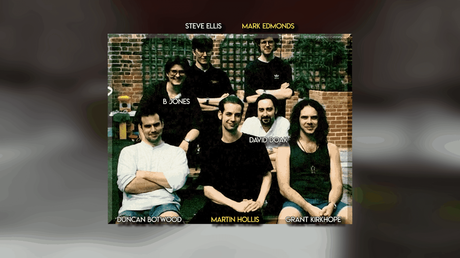 A good chunk of the GoldenEye crew.
A good chunk of the GoldenEye crew. Film sets are exercises in controlled chaos. So, do forgive the team behind the GoldenEye film if they didn't even remember those couple of days during the 6-month-long shoot when several video game developers from Rare dropped by to take pictures of everything - props, costumes, every single set, models, and miniatures. The developers said they needed all of this "as reference for all of the in-game art," and the GoldenEye crew graciously allowed them to take what they needed - even set blueprints and an early copy of the script - as long as they didn't get in the way.
"I took hundreds of photos on 35mm film," lead environmental artist Karl Hilton recently told MEL Magazine in a 21st anniversary oral history article I'll be quoting from.
"It was a cool experience, never having been to a movie set before. Pierce Brosnan might have been in the canteen when we were having lunch, but we didn't see him in any scenes acting on set," explained gameplay engineer Mark Edmonds.
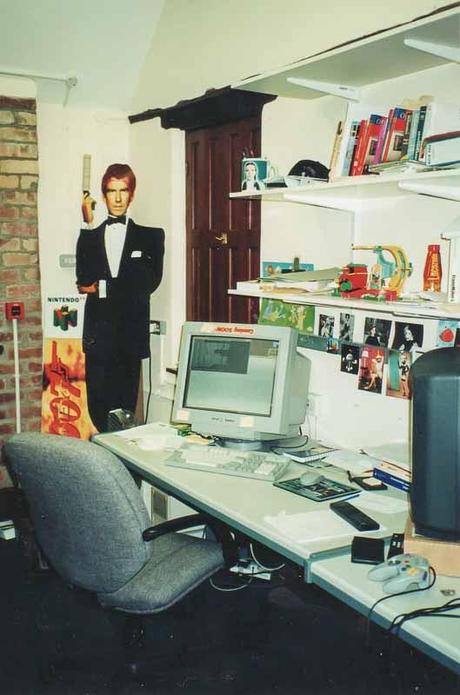 It's ok if the real Brosnan didn't notice them - they had a cardboard cutout of him in their office!
It's ok if the real Brosnan didn't notice them - they had a cardboard cutout of him in their office! But the game took too long. Originally rumored to be a 2D side-scrolling Super Nintendo game expected out by Christmas 1995, lead developer Martin Hollis turned it into a 3D first-person shooter for Nintendo's yet-to-launch system, the N64. The price of testing out a new system and having to create game mechanics from scratch, however, meant a seriously protracted development process. By the Hollis' 9-person team of fresh outta college eccentrics finished their work, the N64 had already been on the market for a full year and Brosnan's second Bond movie, Tomorrow Never Dies, was already in the can and several months from release.
Everyone knows the best time to play a game based on a movie is two years after that movie has left theaters and just three months before its sequel comes out. Right?
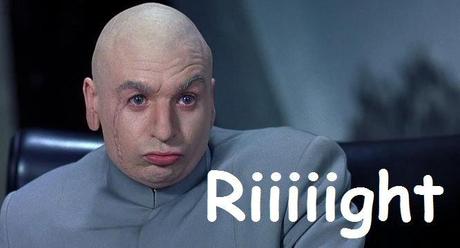
Yeah, no, this was bad. Not quite let's-bury-the-unsold-cartridges-in-a-New-Mexico-landfill-ala-E.T. bad, but definitely a situation where it felt like the game was a sunk cost. GoldenEye 64 - the fruit of nearly 3 years of groundbreaking labor - had become a mere afterthought. When Hollis took a finally-playable version to E3 in June 1997, "No-one who played the game at [E3] seemed terribly impressed. Worse, most people just walked by without playing."
A first-person shooter on [pause to make disgusted face] a video game console? [A series of huffy noises followed by] Well, I never!
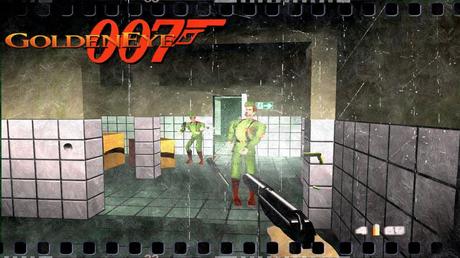
In 1997, the video game industry was in the midst of an unexpected comeback after a multi-year slump. The Nintendo 64 and Sony Playstation had just begun a lucrative console war and games were rapidly reaching new technical heights . The industry was on track to match its 1989 high for most video games sold and total sales of games and consoles combined was projected to hit $5.2 billion, up more than 50% from the year before.
But this was largely on the back of titles like Final Fantasy VII and Mario Kart 64. A movie tie-in game? Yeah, ok. Sure. That'll be a hit...not! (Remember, in 1997, we were still making "not" jokes.) AND it's a first-person shooter? Good luck with that.
Hollis, in a 2004 European Developer's Forum presentation, recalled how the gaming world of '97 viewed FPS: "The world's most famous first-person-shooter, Doom is ancient history. It is four years old. Quake is last year's game, but still hot. Featuring polygonal backgrounds and characters, it is the new king of the shooters, having sold around 1 million copies. But Doom and Quake have had very limited success on consoles. PCs and FPSers go together. Any other way of thinking is heresy. Customers don't like their FPSing on console."
As a Yoshi's Island, Donkey Kong Country, and Killer Instinct devotee at the time, I recall struggling to get into FPS games. Turok: Dinosaur Hunter, for example, had been released on the Nintendo 64 earlier in '97, and despite all of its creative accolades I rented it from Blockbuster for one weekend and never felt the need to play it again. Games like Doom, meanwhile, had trickled to home consoles several years earlier but were never as fun as they were on the computer. Maybe home video game consoles simply weren't made to be murder and steal simulators.
I'll do my homework in a minute, ma, I swear. I just have to beat my brother's best time on the Depot level.
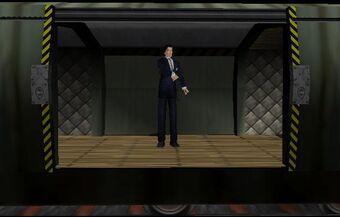
Something about GoldenEye 64 felt different though. The ability to step into an icon like Bond helped acclimate you to the surroundings and enhance the vicarious fantasy of seeing everything through his eyes. Ditto for getting to navigate through large 3D environments with clear objectives but surprising leeway. Wanna run around shooting people like you're the Terminator? Or maybe sneak around tight corners and karate chop guards in the back? Cool, you decide what kind of Bond you want to be, maybe even make challenges out of it. See, for example, if you can make it through certain levels without killing anyone, and then see how fast you make it through on the different difficulty levels.
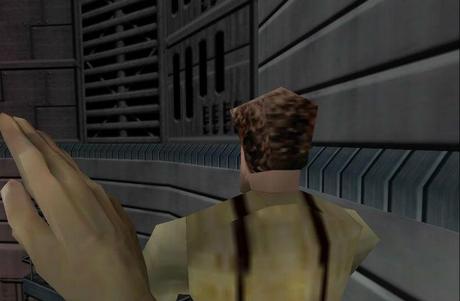
Judo Karate chop.
Wanna play out the entire plot of the movie? They had the script and digital likeness rights to all of the major characters except for Joe Don Baker's CIA character Jack Wade. So, knock yourself out with the story missions. You just might find the film's big action scenes have been extended.
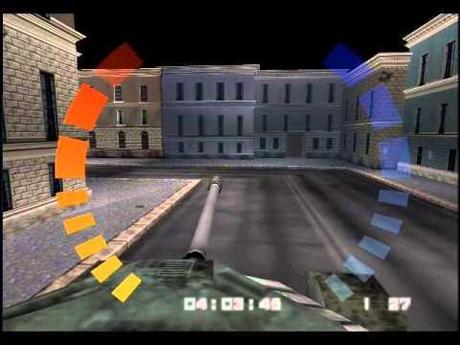 You can even drive the tank!
You can even drive the tank! Want to skip all that and simply fight your friends to the death, long, long before such things became central to video game powerhouses like Fortnite? Go crazy. They added in a four-play multiplayer option at the last minute when Nintendo wasn't looking. (Their other top-secret plan - to let you play as any of the prior Bonds - was nixed when they learned they didn't actually have the likeness rights to anyone other than Brosnan. Connery, it was feared, would ask for a LOT of money.)
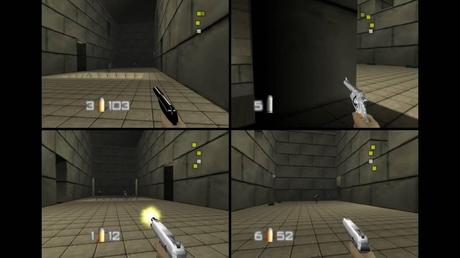 The 4-player mode was made possible by the N64 coming standard with 4 controller ports.
The 4-player mode was made possible by the N64 coming standard with 4 controller ports. It all added up to a gaming experience that felt new and wildly addictive - the type of addictive where you eventually have the game taken away by your mom when one too many homework assignments ended up sacrificed to the video game gods.
Bond became the perfect vehicle to challenge long-standing assumptions about the types of games people would play on home consoles like the N64.
A big, stinking success
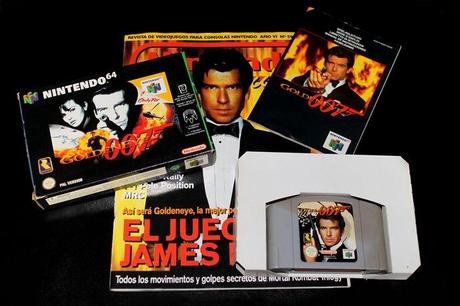
Nintendo - which originally only produced 1 or 2 million GoldenEye 64 cartridges - was caught flat-footed and scrambling to keep up with demand as customers emptied store shelves and racked up Blockbuster late fees. "We all thought we'd missed the chance to sell big numbers!" Hilton recalls. "Nintendo reacted quickly and got more games in the shops - at that point the sales took off again."
"We were all surprised by how successful it turned out to be, as we were all a little uncertain of the final game, mainly because there was so much we still wanted to implement and change."
Karl Hilton
They were surprised? Try MGM.
"A far bigger success than the studio imagined it would be."
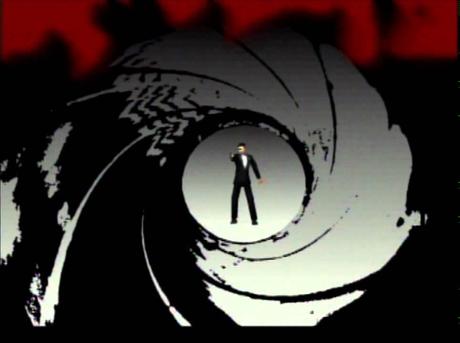
It was a completely improbable lifeline for the Bond franchise, certainly not something anyone at MGM or EON expected. Sure, Ian Fleming's favorite son was no stranger to games. Parker Brothers released James Bond 007 on the Atari, Commodore 64 and ColecoVision in 1983, and in the years since, the world's greatest spy had appeared in over 10 games. Below, a sampling:
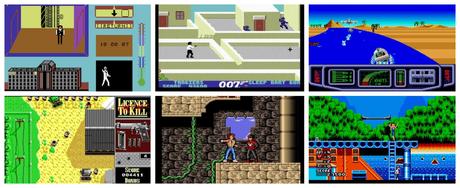 Left to right: (top) A View to a Kill, The Living Daylights, Live and Let Die, (bottom) License to Kill, Bond Jr., and James Bond 007: The Duel
Left to right: (top) A View to a Kill, The Living Daylights, Live and Let Die, (bottom) License to Kill, Bond Jr., and James Bond 007: The Duel Prior to GoldenEye 64, however, the Bond games were little bonuses, not main attractions. They were less robust profit-generators and more mandatory tie-ins or stop-gaps to keep the franchise alive while legal wranglings kept 007 off the big screen for 6 years. Indeed, prior to both GoldenEye and GoldenEye 64 the Bond franchise was fighting for its life.
"That's that guy my dad likes"
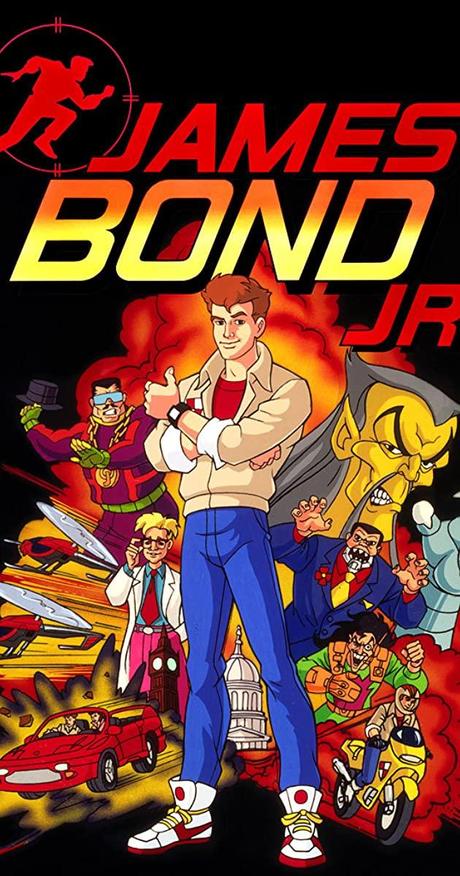 A cartoon series about James Bond's nephew - who is for some reason called James Bond Jr. - aired 65 episodes from '91 to '92.
A cartoon series about James Bond's nephew - who is for some reason called James Bond Jr. - aired 65 episodes from '91 to '92. "It has the potential to be huge again, but I'll you this: I wouldn't spend $50 million on it," said one Beverly Hills entertainment law firm partner in a 1994 Wall Street Journal piece about MGM's effort to relaunch Bond.
When a new management team headed by former Paramount boss Frank Mancuso took over MGM in 1993, the first thing they did was launch an assessment of all studio assets. The old lion may have once been home to classics like Gone With the Wind (1939)and The Wizard of Oz (1939), but the studio hadn't experienced a hit since Thelma & Louise (1991) and hadn't turned a profit since 1986. So many of MGM's debts and loans had defaulted that U.S. banking law required Credit Lyonnais - studio owner since 1992 - to offload the company by 1997.
How bad could it be, though? MGM owned James Bond, one of the most lucrative film franchises in history! Crank out another one of those toot sweet and grab some earplugs because the lion will roar again and it will be deafening.
Mancuso wasn't so sure. He commissioned a marketing survey that produced some pretty damning results about the public's supposed "appetite" for Bond. "Because it had been over a decade since there had been a Bond movie that the audience actually cared about, the younger generation of filmgoers - the generation which studios are always seeking - was completely obvious to Bond," according to former MGM executive Jeff Kleeman's recollection of the survey results. "Teen boys, who were really what were considered the core audience for action movies, had one of two responses: 'Who's James Bond?' or, 'Oh, that's that guy my dad likes.'"
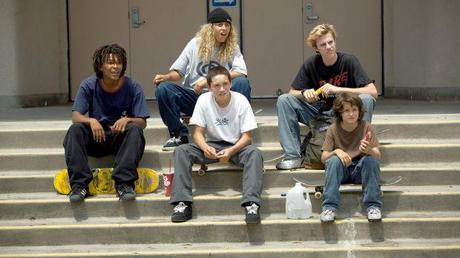 mid90s teens
mid90s teens "That's that guy my dad likes?" Ouch. Lasers, sharks, crocodiles, voodoo, and even deep space had failed to topple 007, but good, old-fashioned indifference might finally do the trick.
Mancuso allowed the GoldenEye film to push forward but with a budget half the size of True Lies, Bond superfan James Cameron's take on an Americanized 007 movie. Still a lot of money for a Bond project at that time, but not on par with the competition and a good indication of the immense pressure they were under.
"Nobody took it seriously"
Given that and any number of other more pressing concerns throughout production, GoldenEye 64 rarely warranted a second thought. "There had been a deal with Nintendo to do a video game, and, frankly, nobody took it seriously," MGM studio executive Jeff Kleeman told the authors of the 2020 oral history book Nobody Does It Better. "Video games weren't quite the phenomenon they are now, and certainly movie studios weren't obsessed with the ancillary marketing of creating video games off their movies. It was nice, and they were doing it, but it wasn't a big deal."
In short: GoldenEye, the movie, was MGM and EON's problem to worry about; GoldenEye 64 was just something Nintendo was doing.
"Then the video game is a monster success - in its own way, as successful as the movie [the game reportedly grossed $250 million]," Kleeman continued. "What happened is thanks to the Nintendo video game, those 16-year-olds who went and saw GoldenEye and loved it also bought the game. When they played the game at home, their younger siblings who had not been allowed to see the movie became obsessed with the game. Now you had 6-year-olds, 7-year-olds, 8-year-olds who were suddenly GoldenEye and James Bond fans, even though they'd never seen the movie. And this just sent the studio into stratospheric joy."
What he described is almost exactly what happened in my household where my older brothers brought home a game based on some movie I hadn't seen and then....like 3 months passed and all I remember from that time is playing the hell out of GoldenEye 64. I played the entire game as Bond before I'd ever seen a Bond movie.
Playing as Bond before seeing Bond
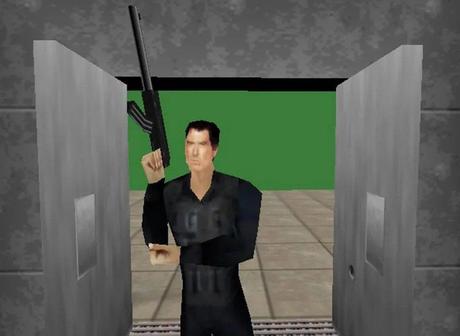
Controlling 007's digital avatar, I had a license to kill as many bad guys - and even some of my brothers and friends in multiplayer - as I wanted.My parents wouldn't let me see the actual GoldenEye film - a Bond girl with literally killer thighs was but one of many elements they didn't like - but had no problem letting me loose on the game version. I don't recall fighting them on that. After all, who needs the movie when you have one of the best video games of all time?
My experience was hardly unique. "I've met young kids out there, and I don't think they've even seen the Bond movies," Pierce Brosnan said nearly a decade later while promoting Everything or Nothing (2004), the first game to feature both Brosnan's likeness AND voice acting. "They've heard of 'em, but they connect straight to the game because that's where their head is at."
The legends return for that sweet video game money
Brosnan came back to voice act as Bond two years after his last movie. Connery's got him beat: He returned to record new dialogue for Electronic Arts' expanded version of From Russia With Love - the film came out in 1963, the game in 2005! "Can you maybe try to sound...younger?" became a slightly indelicate direction in the recording booth.
Connery, however, didn't do it for the money. According to the game's executive producer Glen Scholfield, Connery had been humbled by the ongoing challenge of trying to impress the grandkids.
"His grandkids were more excited about video games than they were about his movie career," Scholfield told author Mark Edlitz. "So we gave him a bunch of free video games. We gave him a console so he could bring it back to them. For him, it was about them."
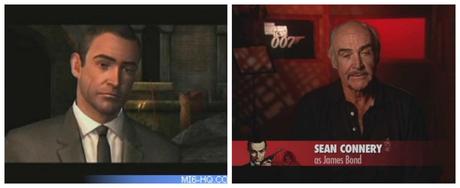
Brosnan, Connery, John Cleese, Richard Kiel, and various other franchise legends technically recorded their final line of original 007 dialogue in a video game, not a movie. In fact, if you include the video games that means Heidi Klum, Mýa, and Shannon Elizabeth have played Bond Girls and Willem Dafoe a Bond villain since they were all cast to provide their likeness and voices to Everything or Nothing, an original Bond story co-written by GoldenEye/ Tomorrow Never Dies scribe Bruce Feirstein. (Several years after that, Feirstein helped update the2010 GoldenEye 007 game remake for the Daniel Craig Bond.)
The people who produced GoldenEye 64, however, didn't have anything to do with those later games. EA took over 007 adaptation duties, and Nintendo sold its ownership stake in Rare to Microsoft, yielding the FPS genre to the XBox and Playstation to fight over. Perfect Dark, developed by the same team that worked on GoldenEye 64, failed to replicate the same level of success. Based on this trailer for an upcoming documentary about the making of GoldenEye 64, there's still some regret about what could have been:
The Fundamental Appeal of Bond
"I remember going to the Bond movies myself when I was in my very early 20s," Cleese recalled while promoting Everything or Nothing. "I came out walking slightly like Bond, beginning to act it out. It's a great temptation, least of all for young males."
That's what GoldenEye 64 and subsequent 007 games (there hasn't been a new one since 2012) indulged: our desire to pretend to be Bond. However, GoldenEye 64 seems especially unique. Not so easily reduced to a mere James Bond simulator, GoldenEye 64 changed the course of video game history. There had been FPS titles before and there were technically more impressive ones later, like Perfect Dark, but nothing had hit quite like GoldenEye. An entire generation was unknowingly training itself in a new way to play video games.
Without really meaning to, a ragtag group of programmers and gaming nerds operated with minimal oversight/interference from Nintendo or the Bonds rights holders and created a game so impossibly fun and successful that it established the template for what was to come.
And if some of those kids graduated to become to be ticket-buyers to Tomorrow Never Dies, World Is Not Enough, Die Another Day, or any of the Daniel Craig era movies, MGM happily took the win. At least when asked about Bond, fewer of them would say, "You mean that guy my dad likes?"

